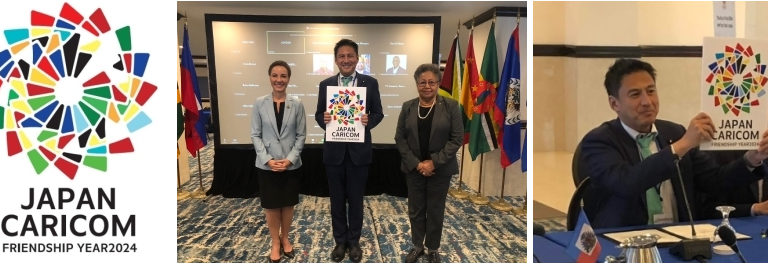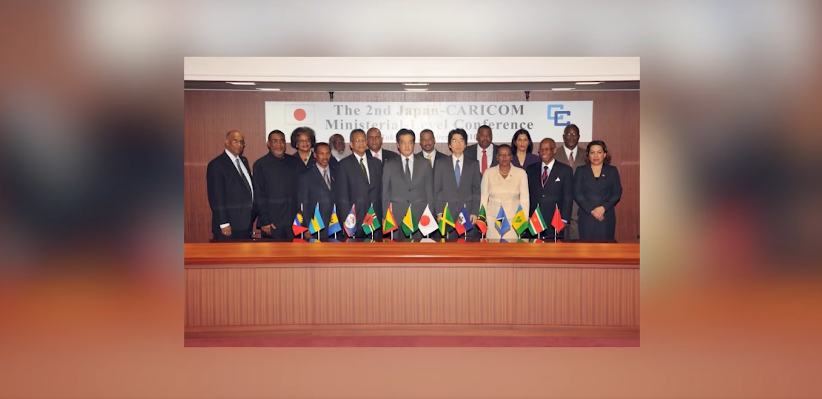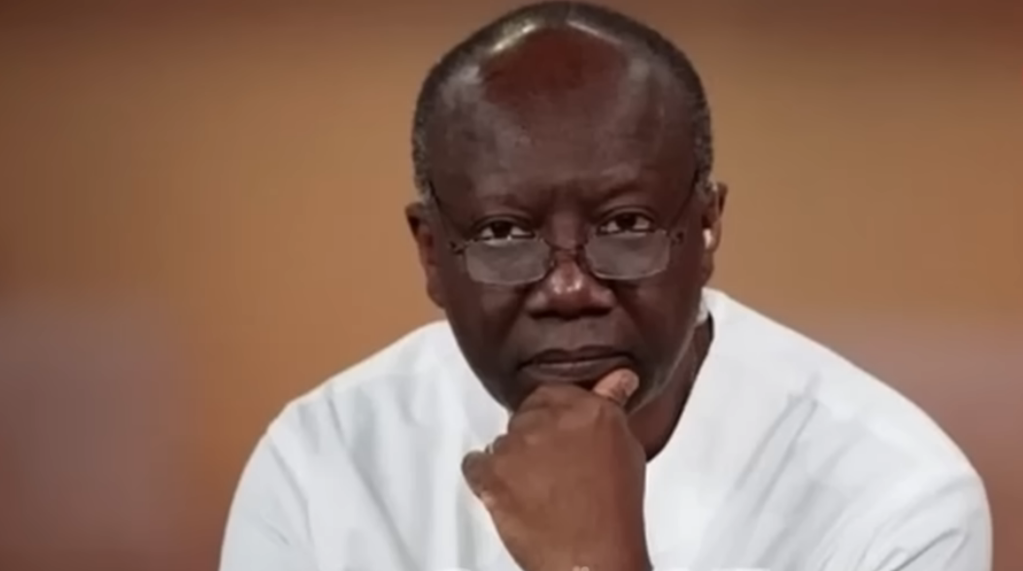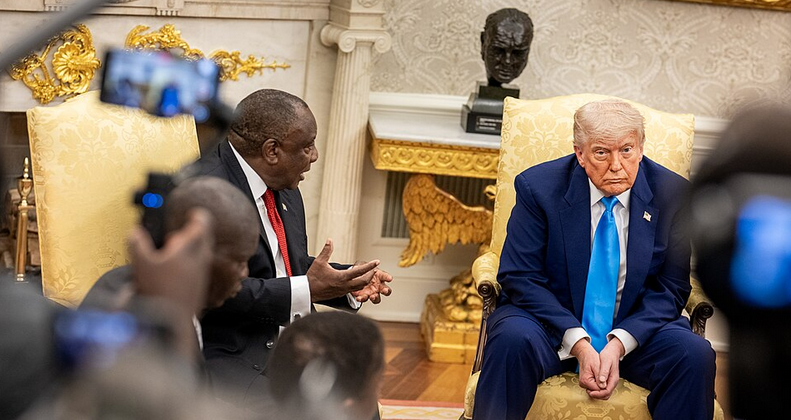Photos: Ministry of Foreign Affairs of Japan\Facebook
(Caribbean Community (CARICOM) Secretariat, Turkeyen, Greater Georgetown, Guyana) – The Eighth CARICOM-Japan Ministerial Conference, held on 14 December in Tokyo, reaffirmed the bilateral cooperation between CARICOM and Japan.

Co-chaired by Dr. the Hon. Vince Henderson, Chair of the Council for Foreign and Community Relations/Minister of Foreign Affairs of Dominica and Mr. Iwaya Takeshi, Minister of Foreign Affairs of Japan, the meeting focused on cooperation in three main areas: sustainable development, strengthening bonds through exchanges and friendship, and addressing international challenges.
Please see below, the Joint Statement emanating from the Conference.
Ministerial Joint Statement for 8th Japan-CARICOM
(Tokyo, 14 Dec 2024)

- The Eighth Japan-Caribbean Community (CARICOM) – Ministerial Conference
was held in Tokyo, Japan, on 14th December 2024, with the participation of the
Minister for Foreign Affairs of Japan and the Ministers of Foreign Affairs and
other Heads of Delegations of the Member States of the Caribbean Community.
The Minister for Foreign Affairs of Japan, IWAYA Takeshi and the Minister of
Foreign Affairs, International Business, Trade and Energy of Dominica, The
Honourable Dr. Vince Henderson, served as Co-chairs. - On the occasion of the commemoration of the Japan-CARICOM Friendship Year
2024, which marks the 30th Anniversary of relations between CARICOM and
Japan, the Foreign Ministers reaffirmed their shared commitment to work under
global partnership to promote values and principles such as freedom, democracy,
the rule of law, human rights, and seek for peace and economic prosperity. - The Foreign Ministers welcomed the steady expansion and deepening of Japan-
CARICOM cooperation, particularly under the “three pillars of Japan’s
CARICOM Policy” announced during the First Japan-CARICOM Summit in 2014. - The Foreign Ministers acknowledged the shared challenges facing Japan and
CARICOM Member States, including threats to a free and open international
order based on the United Nations Charter and the rule of law in the
international community, and the intensification of global challenges, which
require a collaborative approach. In order to create solutions to the given
challenges, the Foreign Ministers expressed their determination to further
deepen and expand cooperation under the three pillars, based on the initiatives
of both Japan and CARICOM.
First Pillar: Cooperation towards Sustainable Development including
Overcoming the Vulnerabilities Particular to Small Island Developing States - The Foreign Ministers affirmed that CARICOM Member States, as small island
and low lying coastal developing states, are a special case for sustainable
development with unique and particular vulnerabilities, and that overcoming
these challenges is increasingly important due to the effects of climate change
and environmental degradation and thus effective global responses are needed.
Japan reaffirms its commitment to actively supporting effective responses that
address the specific needs of Small Island Developing States. In this regard, the
Foreign Ministers of CARICOM Member States took note of Japan’s reiteration
of its position that it is permissible to preserve the existing baselines and
maritime zones established in line with the United Nations Convention on the
Law of the Sea (UNCLOS), notwithstanding the regression of coastlines caused
by climate change related sea-level rise. The Foreign Ministers also took note of
the AOSIS Leaders’ Declaration on Sea Level Rise and Statehood (September
2024). - The Foreign Ministers expressed their appreciation for Japan’s continued
solidarity and its elaborate assistance which is not necessarily based only on per
capita income, but is tailored to each country’s circumstances. They further
emphasized the importance of a comprehensive approach to financing for
development that considers various factors, not limited to per capita income such
as structural and environmental vulnerabilities. - The Foreign Ministers, in keeping with Japan’s Diplomatic Initiative toward
Latin America and the Caribbean, welcomed Japan’s expression of its continued
support for the full utilization of its expertise and experiences in sectors, some of
which are new, including maritime and oceanic affairs, disaster risk reduction,
climate change, food security, public safety and Women, Peace and Security
(WPS) based on the concept of human security. - The Foreign Ministers reaffirmed the importance of assistance under the Japan-
CARICOM Friendship and Cooperation Fund, which is Japan’s public and
private initiative since 2000, and decided to continue their cooperation in this
regard, mindful of its flexible operation and possible synergy with other
assistance programs.
Second Pillar: Deepening and Expanding Bonds Founded on Exchanges and
Friendship - The Foreign Ministers welcomed the deepening of cultural exchanges and
promotion of mutual understanding of cultures between the public and private
sectors at various levels during the Japan-CARICOM Friendship Year 2024, and
confirmed they will maintain the momentum and further strengthen mutual
understanding and friendly relations for the next decade. - The Foreign Ministers appreciated the results of people-to-people exchanges
through programs such as the Japan Exchange and Teaching Programme (JET)
and the Japan-CARICOM Young Diplomats Invitation Program. They reaffirmed
their commitment, given the importance of these programs, to continue people-to-
people exchanges at all levels. - The Foreign Ministers welcomed the hosting of Expo 2025 in Osaka, Kansai,
Japan under the theme, “Designing Future Societies for our Lives”, and noted
mutual cooperation for the Region’s participation in the Expo.
Third Pillar: Cooperation in Addressing Challenges of the International
Community - The Foreign Ministers of CARICOM Member States welcomed Japan’s expressed
commitment to the promotion of cooperation through intra-regional groups,
complementing bilateral and multilateral diplomacy based on its “Diplomatic
Initiative toward Latin America and the Caribbean”. - The Foreign Ministers recognized the growing importance of cooperation between
Japan and CARICOM as global partners, particularly as the international order
faces new challenges and reaches a historic turning point. They confirmed that
any unilateral attempts to change the status quo by force or coercion are
unacceptable anywhere in the world, and also expressed strong opposition to
economic coercion. They affirmed that such challenges to the international order
are a shared concern between Japan and CARICOM. - The Foreign Ministers reaffirmed their commitment to realizing a world without
nuclear weapons. They converged on the importance of maintaining and
strengthening the international regime of nuclear disarmament and non4
proliferation, without prejudice to the use of nuclear energy for peaceful purposes,
with the Treaty on the Non-Proliferation of Nuclear Weapons (NPT) as the
cornerstone. The Foreign Ministers stressed that the 40-year long decline in
global nuclear arsenals must be sustained and not reversed. - The Foreign Ministers recognized the urgent need to make the United Nations
Security Council a more representative, legitimate, effective, and efficient body
and confirmed the necessity of Security Council reform, including the expansion
of both permanent and non-permanent membership categories. They underlined
the importance of giving due consideration to representation of small and
medium size Member States, including Small Island Developing States (SIDS).
Looking ahead to the 80th anniversary of the founding of the UN, the Foreign
Ministers confirmed that it is important to initiate text-based negotiations in
order to achieve concrete results and shared recognition of the commitment to
multilateralism. - The Foreign Ministers commended Japan’s efforts on the Green Climate Fund
(GCF) and the Fund for Responding to Loss and Damage (FRLD). They confirmed
that they will continue to work closely in the international arena on these
initiatives and on specific themes such as the Bridgetown Initiative, the UN SDG
Stimulus, and the Multidimensional Vulnerability Index (MVI) and baselines. At
the 4th International Conference on SIDS held in Antigua and Barbuda in May
2024, Japan stressed the importance of addressing climate change, disaster risk
reduction and oceans, and emphasized that it will continue to provide necessary
cooperation in consideration of the unique vulnerabilities of SIDS. Japan also
stressed that it will continue to work together with SIDS in the next decade as a
partner of SIDS. - The Foreign Ministers affirmed their commitment to the implementation of the
2030 Agenda for Sustainable Development, including its economic, social and
environmental aspects, and to the achievement of the 17 Sustainable
Development Goals and associated 169 targets. They recognized the need to
reinvigorate the global partnership for sustainable development and affirmed
their commitment to work closely together to implement the “Pact for the Future”
Action 12 adopted at the Summit of the Future. They recalled the importance of
Goal 17 of the SDGs. - The Foreign Ministers confirmed the importance of sustainable use of marine
living resources, whose most serious source of threats is IUU fishing practice and
harmful subsidies related to overcapacity and overfishing, among others. The
Foreign Ministers welcomed the adoption of the Agreement under the United
Nations Convention on the Law of the Sea on the Conservation and Sustainable
Use of Marine Biological Diversity of Areas beyond National Jurisdiction and
called for its early entry into force. The Foreign Ministers also committed to
working together to advocate for securing international support for the
sustainable use of living marine resources in line with SDG 14.6, and highlighted
the importance of the prompt entry into force of the Fisheries Subsidies
Agreement of the WTO. They emphasised the universal and unified character of
the United Nations Convention on the Law of the Sea (UNCLOS), and reiterated
that all the maritime claims must be based on the relevant provisions of the
UNCLOS 1982, which sets out the legal framework within which all activities in
the oceans and seas must be carried out. The Foreign Ministers y affirmed the
importance of maintaining freedom of navigation and overflight consistent with
UNCLOS and emphasized that disputes should be resolved peacefully in
accordance with international law, without the threat or use of force. - The Foreign Ministers shared their grave concern over the advancement of
nuclear and missile activities by North Korea as well as increasing military
cooperation between North Korea and Russia. They underlined the need for
dialogue and reaffirmed their commitment to the complete denuclearization of
North Korea in accordance with relevant UNSC resolutions. The Foreign
Ministers also confirmed the need for an immediate resolution of the abductions
issue. - Regarding the situation in Venezuela, the Foreign Ministers stressed that the
rules, such as respect for human rights and rule of law, be respected by all parties
in Venezuela, and that dialogue between the ruling and opposition parties are
promoted toward the restoration of democracy in Venezuela. The Foreign
Ministers reiterated the call for the peaceful resolution of the Guyana-Venezuela
Border Controversy in accordance with international law and expressed their
support for the process underway before the ICJ in that regard. The Foreign
Ministers also expressed support for the process of resolution of Guatemala’s
Territorial, Insular and Maritime Claim against Belize (Guatemala/Belize) at the
ICJ and called on all Parties to abide by the ICJ decision when delivered. - The Foreign Ministers recognized the significant and profound impact of the
situation in Haiti on the Haitian people and on peace and security in Latin
America and the Caribbean. They emphasized the importance of restoring
stability to facilitate the full restoration of democracy in the country. They further
affirmed the complementary roles of the CARICOM Eminent Persons Group
through its valuable support to Haiti and Japan’s assistance including in the
security and humanitarian aid sector, as crucial to achieving these goals. - The Foreign Ministers recommitted to the continued pursuit of efforts to achieve
the above objectives and to further strengthen their relationship as global
partners on issues of common concern to the international community. The
Foreign Ministers confirmed the importance of regular high-level political
dialogue between Japan and CARICOM, to enhance bilateral cooperation and
strategic coordination toward the achievement of shared goals. - CARICOM Foreign Ministers expressed their appreciation for the warm
hospitality and excellent arrangements provided by the Government of Japan for
the Eighth CARICOM-Japan Ministerial Meeting.






